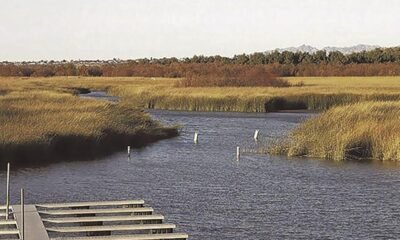ASU
House Bill Paves the Way for College Athletes to Cash In on Their Own Likeness

Arizona universities are exploring new legislation that could revolutionize collegiate athletics by enabling them to pay student athletes. This move aims to attract better recruits and enhance the state’s athletic programs.
The proposed Senate Bill 1516, currently awaiting a final House vote, seeks to build on a 2021 law that allowed student athletes to earn income from their names, images, and likenesses. If enacted, it would permit universities to offer cash payments to athletes in return for promoting their institutions.
Significantly, the bill stipulates that while athletes can receive these payments, they will not be classified as employees.
The impetus for SB1516 stems from an expected federal court ruling in California regarding ongoing litigation against the NCAA, which has historically prohibited any form of financial compensation for college athletes. In recent years, the NCAA has started to permit student athletes to negotiate endorsement deals, thereby opening avenues for financial gain.
If passed, the legislation would allow institutions such as the University of Arizona, Arizona State University, Northern Arizona University, and Grand Canyon University to allocate significant funds for athlete compensation. Each institution would have a budget cap of $20.5 million annually for these payments.
Notably, this cap applies uniformly, regardless of university size or the number of sports programs offered. For example, the University of Arizona, with its extensive athletic offerings, would have the same budget as GCU, which focuses primarily on basketball.
Sponsored by Sen. T.J. Shope, the bill includes measures to restrict the sources of funding for these cash distributions. Specifically, it prohibits the use of student fees while introducing raffles as a potential funding source.
Lobbyist Mike Haener from Arizona State University suggested that 50-50 raffles could be an effective fundraising method, allowing fans to participate at games. For instance, if 10,000 attendees each spent $10 on raffle tickets, that could yield $100,000, with $50,000 awarded to a winner and the remainder supporting athlete payments.
While this is a start, raising the entire $20.5 million through such means poses a significant challenge.
The legislation permits universities to conduct more lucrative raffles with higher ticket prices, which could potentially generate greater revenue. Concerns persist, however, that other states are already positioning themselves to offer similar compensation plans for student athletes as soon as the NCAA’s legal decisions are finalized.
Federal Judge Claudia Wilken is finalizing revisions to a ruling that could be released soon, which would impact how this legislation is implemented. Jason Corriher from the University of Arizona emphasized the urgency of passing this bill to prevent Arizona schools from falling behind in recruitment.
State Rep. Matt Gress echoed these concerns, asserting that the existing Name, Image, and Likeness (NIL) law needs significant updates to keep up with competitors.
After federal approval, Arizona universities may not require statutory changes to start compensating athletes directly, but officials believe preemptive legislation is essential. Jamie Boggs of Grand Canyon University stressed the necessity of having these provisions ready to respond swiftly to competitive pressures.
The legislation clarifies that students receiving payments from universities will not hold employee status, which could complicate direct relationships between institutions and athletes. Additionally, new regulations will govern how student athletes can enter contracts with external entities, ensuring they do not enter agreements with companies related to substances like marijuana or alcohol.
Moreover, protections are included to prevent the NCAA from disenfranchising students earning from their NIL rights, ensuring that universities can offer compensation without legal hindrances.
Each university is similarly capped on direct payments, promoting fairness rather than competitive disparities based on program size. However, the legislation allows latitude for individual athletes to secure more lucrative private deals independently from the schools.
Corriher added that universities would also be permitted to collaborate with third-party entities to enhance NIL opportunities, enabling wider income potentials for student athletes.
Overall, while some legislators express concerns about the implications of professionalizing college sports, many recognize that major changes in the amateur landscape have already occurred.
As this bill progresses, stakeholders await its potential to reshape how Arizona universities engage with and support their student athletes.


















